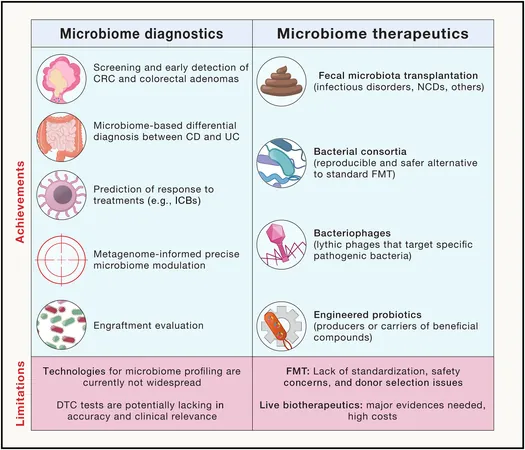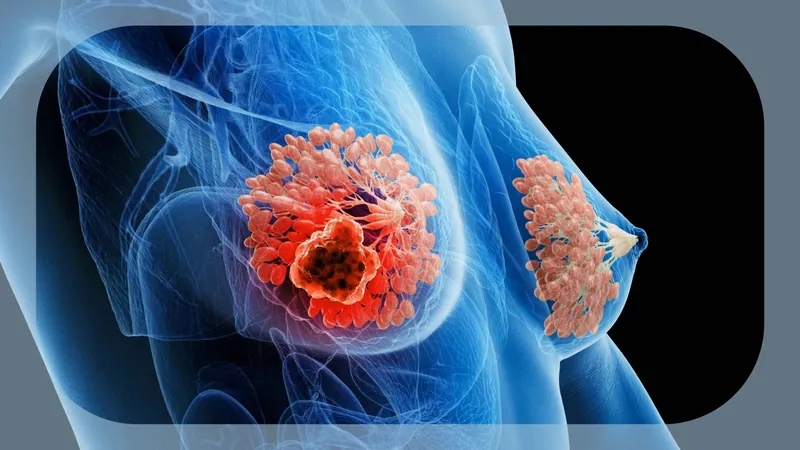
The Future of Microbiota: A Game Changer in Diagnostics and Treatment within a Decade!
2025-06-12
Author: Yu
Microbiota's Role in Medicine Set to Transform in 5-10 Years
Get ready for the healthcare revolution! Experts predict that within the next decade, both diagnostic and therapeutic applications of the microbiota will be groundbreaking. An insightful article in *Cell* highlights how the microbiome could bridge the gap between researchers and clinicians, paving the way for innovative medical advancements.
Dr. Gianluca Ianiro, a leading researcher at the Catholic University and medical director at the Gemelli IRCCS Polyclinic, asserts, The timing is ripe to evaluate potential clinical uses of the microbiome.
Why Aren’t We There Yet?
Despite extensive research, the clinical integration of microbiome applications remains limited, often considered rudimentary. Dr. Serena Porcari, co-author of the *Cell* study, identifies crucial barriers hindering progress.
First, there's a biological challenge—proving the links between microbiome composition and diseases is complicated due to the vast variability within gut flora. Second, methodological issues arise: clinical studies must account for diet, medications, and environmental factors, with a lack of standardized testing protocols.
Logistically, many studies are hindered by limited funding and small sample sizes. The disconnect between scientists and clinicians exacerbates this issue. Lastly, cultural barriers exist; many medical professionals aren’t sufficiently familiar with microbiome research to implement it effectively.
A Bright Outlook for Microbiota Applications
Despite these hurdles, optimism remains high. Professor Antonio Gasbarrini, an authority in gastroenterology, reveals that the microbiota could soon serve as a vital biomarker for early disease detection, particularly colon cancer. It could also indicate therapy responses or help differentiate between diseases like ulcerative colitis and Crohn's.
On the therapeutic front, fecal transplants are evolving into tailored microbial consortia, while bacteriophages—viruses that target harmful bacteria—hold promise. Engineering probiotic strains to deliver beneficial compounds is another exciting avenue.
Accelerating Clinical Implementation
Professor Giovanni Cammarota emphasizes the need for action to hasten the application of microbiome research in clinical settings. Strategies include standardizing microbiota tests, enhancing clinical trial designs, and fostering collaboration between researchers and healthcare professionals.
Upcoming Breakthroughs You Should Know About
The first major clinical tests will likely be a colon cancer screening tool that pinpoints candidates for colonoscopy using specific microbiota profiles. Additionally, tests predicting responses to immunotherapy seem imminent, especially for conditions like lung cancer and melanoma.
Furthermore, microbiota transplantation will advance beyond treating *Clostridium difficile* colitis, aiming to combat multi-drug resistant bacteria and improve outcomes for organ transplant candidates.
The ultimate goal? Harnessing the microbiome to boost immunotherapy efficacy in cancer treatment!



 Brasil (PT)
Brasil (PT)
 Canada (EN)
Canada (EN)
 Chile (ES)
Chile (ES)
 Česko (CS)
Česko (CS)
 대한민국 (KO)
대한민국 (KO)
 España (ES)
España (ES)
 France (FR)
France (FR)
 Hong Kong (EN)
Hong Kong (EN)
 Italia (IT)
Italia (IT)
 日本 (JA)
日本 (JA)
 Magyarország (HU)
Magyarország (HU)
 Norge (NO)
Norge (NO)
 Polska (PL)
Polska (PL)
 Schweiz (DE)
Schweiz (DE)
 Singapore (EN)
Singapore (EN)
 Sverige (SV)
Sverige (SV)
 Suomi (FI)
Suomi (FI)
 Türkiye (TR)
Türkiye (TR)
 الإمارات العربية المتحدة (AR)
الإمارات العربية المتحدة (AR)